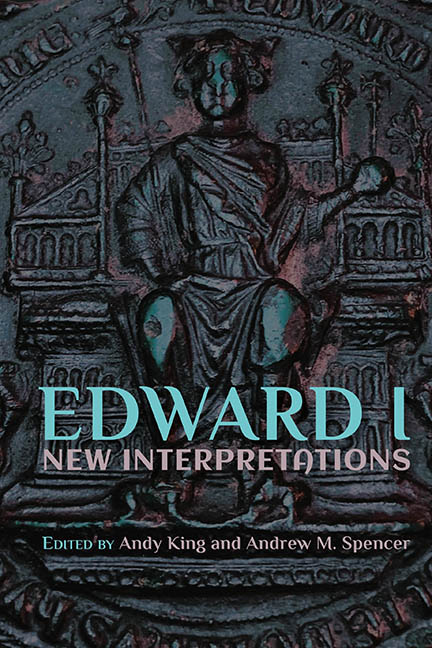Book contents
- Frontmatter
- Contents
- List of Contributors
- Acknowledgments
- Abbreviations
- Genealogy of Edward I
- Introduction
- 1 The Lord Edward and the Administration of Justice across his Apanage, 1254–72
- 2 A Tale of Two Ministers: Robert Burnell, Walter Langton and the Government of Edward I
- 3 Law and Order in the Reign of Edward I: Some New Thoughts
- 4 Magnates, Ritual and Commensality at Royal Assemblies: Bogo de Clare and Edward I’s Easter Parliament, 1285
- 5 Royal Daughters and Diplomacy at the Court of Edward I
- 6 Hearts and Bodies: Edward I and the Scottish Magnates, 1296–1307
- 7 Edward I and the Blessed Virgin Mary
- 8 Letters and Political Discourse under Edward I
- 9 Crisis? What Crisis? 1297 and the Civil War that Never Was
- Index
2 - A Tale of Two Ministers: Robert Burnell, Walter Langton and the Government of Edward I
Published online by Cambridge University Press: 21 March 2020
- Frontmatter
- Contents
- List of Contributors
- Acknowledgments
- Abbreviations
- Genealogy of Edward I
- Introduction
- 1 The Lord Edward and the Administration of Justice across his Apanage, 1254–72
- 2 A Tale of Two Ministers: Robert Burnell, Walter Langton and the Government of Edward I
- 3 Law and Order in the Reign of Edward I: Some New Thoughts
- 4 Magnates, Ritual and Commensality at Royal Assemblies: Bogo de Clare and Edward I’s Easter Parliament, 1285
- 5 Royal Daughters and Diplomacy at the Court of Edward I
- 6 Hearts and Bodies: Edward I and the Scottish Magnates, 1296–1307
- 7 Edward I and the Blessed Virgin Mary
- 8 Letters and Political Discourse under Edward I
- 9 Crisis? What Crisis? 1297 and the Civil War that Never Was
- Index
Summary
THE reign of Edward I has long been recognised as one of the most significant in British history. For good or ill, Edward did more than any previous king to bring Scotland, Wales and Ireland under direct English rule. At the same time, and in pursuit of the same goals, he oversaw momentous developments in the history of national taxation as parliament embedded itself irreversibly in the political and constitutional structure. Along the way, Edward constructed a body of statutory legislation unprecedented in its scope and impact. All this and more Edward accomplished in the face of, and as a direct response to, the challenges he faced as king. Nevertheless, the story is not one of unalloyed success. To be sure, during the first half of his reign, Edward managed to restore the authority and prestige of the monarchy after the disorder of the 1260s. But then, fresh trials from within and outside his kingdom tested him even more in the last decade and a half of his life. When Edward died in 1307, his kingdom was deep in debt, disorder was incipient at home and the seeds had been sown for generations of future conflict within Britain and abroad.
Given the undoubted successes of Edward's first twenty years as king and the relative failure of his last fifteen, opinions about him have typically been rather ambivalent. Nevertheless, it has tended to be the degree and nature of Edward's greatness that has been at issue rather than whether he was ‘a great king’ or not. Contemporaries (English ones at any rate) were certainly in no doubt about his qualities at the time of his death: ‘Compared with his forebears, he was the most warlike, wise and prudent of kings.’ Whether the Welsh, Scottish or Irish who suffered at Edward's hands would have agreed with this is another matter. Modern historians, too, have been at least somewhat more cautious in their views of Edward: ‘He was strong-willed and difficult to divert from his purpose; what is not so clear is whether he was a man of great vision.’
- Type
- Chapter
- Information
- Edward I: New Interpretations , pp. 24 - 43Publisher: Boydell & BrewerPrint publication year: 2020



